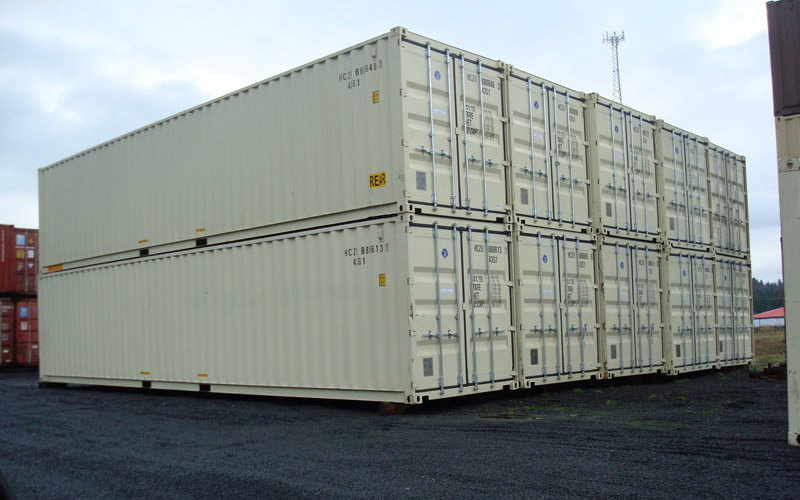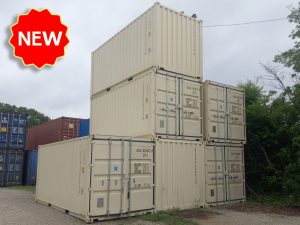The Ultimate Guide to Rent New Shipping Container 40 x 8 x 9.6 for Affordable Housing
The Ultimate Guide to Rent New Shipping Container 40 x 8 x 9.6 for Affordable Housing
Blog Article
The Ultimate Overview to Choosing the Right Shipping Container for Your Demands
When it concerns choosing the appropriate shipping container, comprehending your specific requirements is essential. You'll wish to take right into account elements like dimension, kind, and product to guarantee you make the very best selection. From conventional sizes to specialized options, there's a great deal to discover. Plus, budgeting for both the container and any alterations can make a big distinction. Let's break down the vital elements to aid you discover the perfect suitable for your needs.
Recognizing Delivery Container Sizes
When you're picking a shipping container, understanding the different sizes offered is critical for making the right decision. Shipping containers usually are available in typical sizes of 20 and 40 feet, yet you'll additionally discover other dimensions. Knowing the dimension you require depends on what you plan to store or transport.If you're relocating smaller sized products, a 20-foot container could be ideal, while larger deliveries often call for a 40-foot container. The height can additionally differ; high cube containers offer extra vertical room, which can be helpful for taller goods.Before making a decision, measure your freight, and take into consideration exactly how much space you'll require for filling and discharging. Always factor in potential future demands-- selecting a slightly bigger container may save you hassle down the line. Inevitably, selecting the best size will certainly enhance effectiveness and ensure your items are safe during transportation
Types of Delivery Containers Available
There are a number of sorts of delivery containers offered, each designed for certain purposes and freight demands. The standard dry container is functional, ideal for basic cargo. If you're delivering perishable products, think about a refrigerated container, which preserves a regulated temperature. For large things, high cube containers provide added height, fitting taller loads.If you require to transfer hefty equipment or equipment, level shelf containers offer a tough base without wall surfaces. Meanwhile, open-top containers allow for simple loading of high cargo, with a detachable tarp covering for defense. If you're seeking adaptability, consider a retractable container that can be conveniently stored when not in use.Lastly, specialized containers like storage tank containers are utilized for liquids, while vented containers are developed for bulk freight that requires air flow. Recognizing your freight kind will certainly aid you select the right container to meet your shipping needs effectively.
Material Factors To Consider for Sturdiness
When picking a delivery container, the material plays a vital role in its resilience. You'll wish to evaluate the benefits of steel versus aluminum, especially relating to corrosion resistance. Comprehending these elements can help you make a more informed choice for your delivery requires.
Steel vs. Light weight aluminum Containers
How do you choose between steel and light weight aluminum containers for your shipping needs? Start by taking into consideration resilience. Steel containers are robust and offer outstanding stamina, making them perfect for heavy loads and extreme conditions. They resist damages from effects and are usually more economical, which can be a major element for budget-conscious buyers.On the various other hand, aluminum containers are lightweight, which can conserve you on delivery prices. They're less complicated to steer and are an excellent option if you require to deliver products frequently. Light weight aluminum is normally much more pricey and much less durable than steel. Evaluate your specific demands meticulously, consisting of weight, cost, and the sort of cargo you'll be shipping, to make the best selection for your circumstance.
Corrosion Resistance Variables
Choosing the right product doesn't simply entail weight and cost; corrosion resistance plays a significant role in toughness. When choosing a shipping container, consider the setting it'll face. Steel containers, while solid, can rust if not properly treated. Try to find options with protective finishes or galvanization to boost their lifespan. Aluminum, on the various other hand, supplies all-natural corrosion resistance, making it excellent for coastal areas or damp problems. It can be extra expensive. Furthermore, examine the container's use-- if it'll be exposed to chemicals or severe weather condition, focus on products that can withstand these problems. Buying a corrosion-resistant container currently can conserve you from costly repairs or replacements down the line. Select intelligently for lasting advantages.
Adjustments and Modification Options
Delivering containers aren't simply for delivering products; they can be changed to satisfy your particular needs through numerous adjustments and customization choices. You can convert a typical container right into a comfortable office, a temporary retail store, and even a personal health club. The possibilities are nearly endless.Think concerning adding windows, insulation, or air flow to improve convenience. You could likewise consider electrical wiring, plumbing, and even personalized shelving to boost performance. If safety and security's a concern, enhanced locks can offer tranquility of mind.For aesthetic appeal, you can paint the container or add a special layout to make it attract attention. Do not neglect about floor covering options-- whether you desire durable plywood or something a lot more sophisticated, it can boost the space.Ultimately, tailoring your delivery container to fit your requirements can enhance functionality and develop a distinct setting that reflects your design.
Assessing Your Transport Needs
When it concerns using your modified shipping container, understanding your transportation needs is vital. Start by identifying what you'll be shipping-- whether it's heavy devices, retail products, or individual things. a fantastic read Each kind of cargo has various needs relating to size, weight, and accessibility.Next, take into consideration the range and mode of transportation. Are you shipping in your area, across the country, or internationally? This impacts the container's layout and performance. If you're making use of vehicles, ensure your container fits typical dimensions for easy loading and unloading.Additionally, think of transportation problems. Will your items require special protection from weather or temperature level variations? If so, you might need insulation or air flow functions in your container.Lastly, evaluate how commonly you'll be carrying products. Constant deliveries might call for a much more durable and versatile container to satisfy recurring needs. By addressing these factors, you'll be well-prepared to pick the ideal delivery container for your needs.
Budgeting for Your Delivery Container
Establishing an allocate your delivery container is important for making certain a smooth purchasing procedure. Identify exactly how much you can manage to spend. Maintain in mind that rates can vary substantially based upon dimension, problem, and type. New containers normally cost a lot more, yet used ones can use substantial savings.Next, take into consideration any kind of added costs you might sustain, such as transport charges, shipment costs, and adjustments. If you prepare to customize the container, consider those expenditures also. Study different vendors to compare costs and find the very best deal that meets your needs.Don' t forget to include any kind of permits or regulations that might relate to your acquisition and usage of the container. By plainly detailing your spending plan, you'll be much better prepared to make educated decisions, guaranteeing you get the appropriate container without damaging the bank.
Upkeep and Take Care Of Durability
To guarantee your shipping container lasts for years, routine maintenance is essential. Begin by inspecting the outside for rust, damages, and damage. If you detect any type of problems, resolve them immediately to avoid more damage. Clean the container occasionally, both throughout, to eliminate dust, debris, and wetness that can Full Article lead to corrosion.Ensure the doors secure appropriately and lube the joints to avoid corrosion and sticking. If you're using the container for storage, think about including air flow to decrease humidity and mold growth. For added defense, apply a rust-inhibiting paint or sealant annually.If your container's located in an extreme atmosphere, like coastal areas, you may require to boost upkeep regularity. Keep an eye on the floor covering, as well; any kind of indicators of wear must be fixed today. With these simple steps, you'll expand the life of your shipping container substantially.
Often Asked Concerns
Exactly how Do I Find a Trusted Delivery Container Provider?
To find a trustworthy shipping container provider, begin by looking into on the internet reviews, requesting for referrals from close friends or industry get in touches with, and contrasting prices. Constantly check their qualifications and assurance they use high quality containers that fulfill your demands.

Can I Rent a Delivery Container As Opposed To Buying?
Yes, you can most definitely rent a shipping container rather than purchasing one. Lots of suppliers offer rental choices, which can conserve you cash and provide flexibility if you only need it for a short period.
What Permits Are Required for Container Positioning?

Are Shipping Containers Weatherproof and Ideal for Outdoor Storage Space?
Yes, shipping containers are normally weatherproof, created More Bonuses to withstand extreme conditions. Their durable building keeps your products safe and secure and completely dry, making them ideal for outdoor storage. Just assure appropriate air flow to avoid moisture buildup inside.
How Do I Transfer a Delivery Container When Acquired?

Report this page